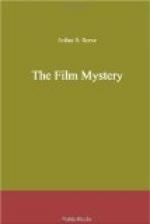I would have guessed him to be an author, I believe, had I met him at random anywhere in the city. He affected all the professional marks and mannerisms, and yet he did so gracefully. I noticed, in the little hall where Huroki placed our headgear, a single-jointed Malacca stick, a dark-colored and soft-brimmed felt hat, and a battered brief-case. That was Millard, unquestionably. The man himself was tall and loose-limbed, heavy with an appearance of slenderness. His face was handsome, rather intellectual in spite of rather than because of large horn-rimmed glasses. His mouth and chin showed strength and determination, which was a surprise to me. In fact, in no way did he seem to reveal the artist. Lawrence Millard was a commercial writer, a dreamer never.
First he greeted Enid, taking both of her hands in his. In this one brief moment all my own little romance went glimmering, for I could not blind myself to the softening of his expression, the welcoming light in hers, the long interval in which their fingers remained interlaced.
And then another thought came to me, hastened, fed and fattened upon my jealousy. The sealed testimony in the case of Millard vs. Millard! Could Enid, by any chance, be concerned in that?
The next moment I dismissed the thought, or at least I thought I did so. I tried to picture Enid’s work on the Coast, to remember the short time she had been in the East. It was possible Millard had known her before she went to Los Angeles, but unlikely.
Millard next turned to Kennedy.
“I just learned of the tragedy a short while ago, Professor,” he exclaimed. “It is terrible, and so amazingly sudden, too! It—it has upset me completely. Tell me, have you found anything? Have you discovered any possible clue? Is there anything at all I can do to help?”
“I would like to ask a few questions,” Kennedy explained.
“By all means!”
He extended a hand to me and I found it damp and flabby, as though he were more concerned than his manner betrayed. He faced Kennedy again, however, immediately.
“Stella and I didn’t make a go of our married life at all,” he went on, frankly enough. “I was very sorry, too, because I was genuinely fond of her.”
“How recently have you seen her?”
“Stella? Not for over a month—perhaps longer than that.”
Manton took Enid by the arm. It was evidently her first visit to the apartment and he was anxious to show her his various treasures.
Millard, Kennedy, and I found a corner affording a view out over the Hudson. After Kennedy had described, briefly, the circumstances of Stella’s death, at Millard’s insistence, he produced the note he had found in her handbag. The author recognized it at once, without reading it.
“Yes, I wrote that!” Then just a trace of emotion crept into his voice. “I was too late,” he murmured.
“What was it you wanted to say?” Kennedy inquired.




